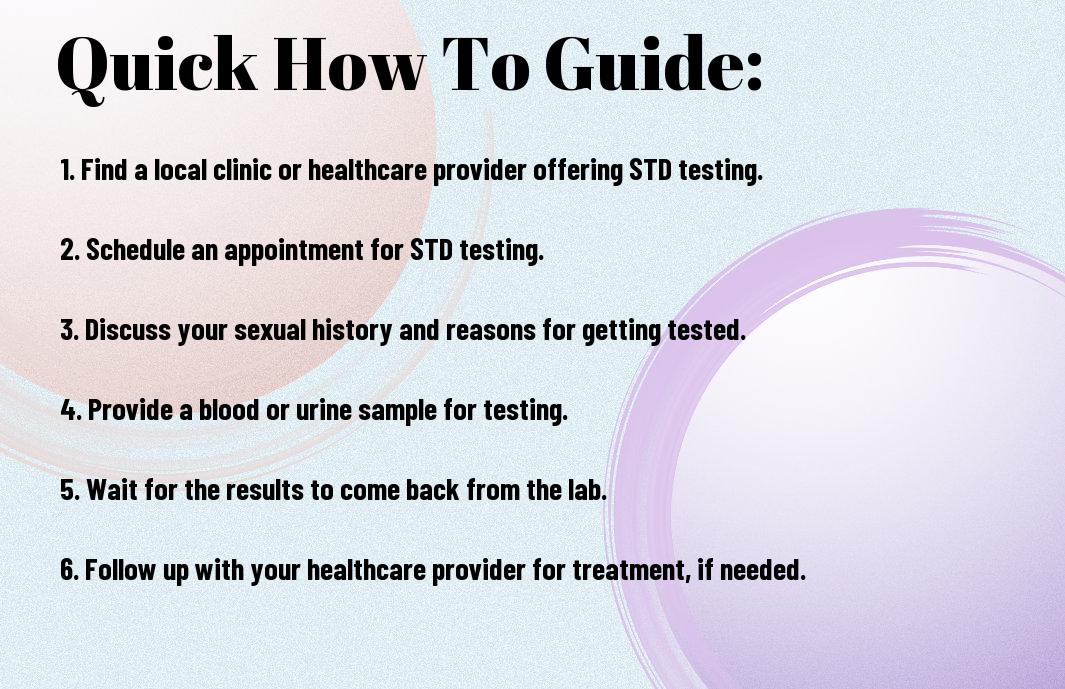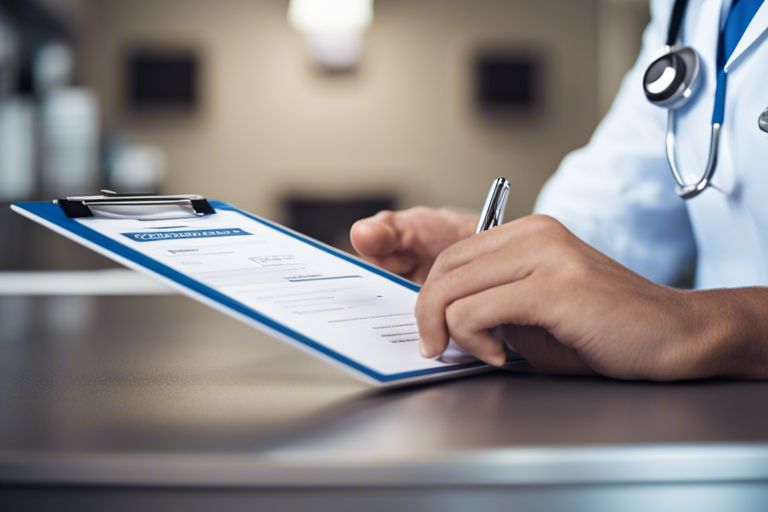There’s no need to feel embarrassed or unsure when it comes to getting tested for STDs. It’s an important step in taking control of your sexual health. This step-by-step guide will walk you through the process, from finding a testing center to what to expect during and after the test. Early detection of sexually transmitted diseases is crucial for effective treatment and preventing further spread. By following this guide, you’ll be taking a proactive approach to your well-being.
Key Takeaways:
- Know the types of STD tests available: Understand the different types of STD tests available, including blood tests, urine tests, swab tests, and physical exams.
- Visit a healthcare provider: Schedule an appointment with a healthcare provider or visit a clinic to get tested for STDs. They can recommend the appropriate tests based on your sexual history and symptoms.
- Confidentiality is key: STD testing is confidential, and your results will only be shared with you. You can also opt for anonymous testing at some clinics.
- Follow-up and treatment: If you test positive for an STD, follow your healthcare provider’s recommendations for treatment. It’s crucial to complete the treatment to prevent further complications and transmission.
- Prevent future infections: Practice safe sex by using condoms, getting tested regularly if you’re sexually active, and communicating openly with your partner(s) about sexual health.

Understanding the Importance of STD Testing
Why You Should Get Tested Regularly
To ensure your sexual health and overall well-being, it is crucial to get tested for sexually transmitted diseases (STDs) regularly. Many people infected with STDs do not show any symptoms, making it easy for these diseases to go undetected and untreated. By getting tested regularly, you can detect any infections early and start treatment promptly.
The Risks of Untreated STDs
Understanding the risks of untreated STDs is crucial in realizing the importance of getting tested. If left untreated, STDs can lead to serious health complications such as infertility, chronic pain, and even an increased risk of contracting other infections. By getting tested and treated for STDs, you can protect yourself and your partners from these potential risks.
A common misconception about STDs is that only people who engage in risky sexual behaviors are at risk of contracting them. In reality, any sexually active individual can get an STD, regardless of their lifestyle or relationship status. It is important to understand that being tested regularly is a responsible and proactive step towards taking control of your sexual health.
Preparing for Your STD Test
Factors to Consider Before Getting Tested
The first step in preparing for an STD test is to educate yourself about the process. Reading a detailed STD Testing Guide: Procedures, Expectations & Results can help you understand what to expect during the testing procedure. It is imperative to consider factors such as your sexual history, symptoms you may be experiencing, and any recent risky behavior that may have exposed you to an STD.
- Educate Yourself: Understand the different types of STDs and how they are transmitted.
- Consider Your Risk Factors: Evaluate your sexual activity and any recent unprotected encounters.
- Plan for Confidentiality: Choose a clinic or healthcare provider that respects your privacy.
Recognizing these factors will help you make informed decisions about getting tested and seeking the appropriate treatment if necessary.
Choosing the Right Testing Method
On your journey to getting tested for STDs, selecting the right testing method is crucial. Different STDs may require specific tests, so it’s imperative to consult with a healthcare provider to determine the most suitable tests for your situation. For instance, if you suspect you have been exposed to HIV, a blood test is typically recommended.
Tips for Reducing Anxiety and Stress
Now is the time to focus on self-care and mental well-being as you prepare for your STD test. Try incorporating stress-reducing activities into your routine to help alleviate any anxiety you may be feeling. Engaging in mindfulness exercises, practicing deep breathing techniques, or seeking support from friends and family can make a significant difference in how you approach the testing process.
- Stay Informed: Educate yourself about the testing process to alleviate uncertainties.
- Practice Relaxation Techniques: Incorporate calming activities like yoga or meditation into your daily routine.
- Seek Support: Share your concerns with a trusted individual to help ease your emotional burden.
Perceiving the testing process as a proactive step towards safeguarding your health can help shift your mindset from anxiety to empowerment.
Finding a Testing Location
Types of Healthcare Providers That Offer STD Testing
Not all healthcare providers offer STD testing, so it’s important to know where to look. Types of healthcare providers that typically offer STD testing include:
- Primary care physicians (PCPs)
- Obstetricians/gynecologists (OB/GYNs)
- Sexual health clinics
- Community health clinics
- STD testing centers
Perceiving symptoms or engaging in high-risk behaviors may prompt the need for STD testing. If you suspect you have been exposed to an STD, you should seek testing as soon as possible to prevent further spread of the infection.
How to Find a Clinic or Testing Center Near You
Near or far, finding a clinic or testing center that offers STD testing is crucial for your sexual health. You can start by searching online for STD testing locations in your area or consult with your primary care physician for recommendations. Many health departments also provide free or low-cost STD testing services.
Another option is to use online resources such as the Centers for Disease Control and Prevention (CDC) website or STD testing locators to find a testing center near you. These tools can help you locate clinics that offer confidential and affordableSTD testing services.
Online Testing Options: Pros and Cons
Whileonline testing offers convenience and privacy, it also has its limitations. Here are some pros and cons of online STD testing:
| Pros | Cons |
| Convenient | Lack of in-person consultation |
| Privacy | Potential for false results |
| Quick results | Not suitable for all types of STDs |
| Accessible from anywhere | Cost may not be covered by insurance |
| Discreet | No follow-up care |
Withonline testing, individuals can order kits online, collect samples at home, and receive resultsremotely. However, it’s important to be aware of the limitations and potential drawbacks of online STD testing before making a decision.
The Testing Process
Once again, the first step in getting tested for STDs is to schedule an appointment with your healthcare provider or a clinic that offers STD testing services. During your appointment, the healthcare provider will discuss your sexual history, any symptoms you may be experiencing, and the reason for your visit. They will then recommend the appropriate tests based on this information.
What to Expect During Your Test
Your healthcare provider will most likely perform a physical exam and may take samples for testing. These samples could include blood, urine, swabs from the genital area, or other bodily fluids. The process may be slightly uncomfortable, but it is important to remember that healthcare providers are professionals who are there to help you.
Types of Tests and Procedures
- Blood Tests: These tests check for the presence of STD antibodies or the actual virus in the blood.
- Urine Tests: These tests screen for STDs by detecting the presence of bacteria or viruses in the urine.
- Swabs: Swabs are taken from the genital area, throat, or rectum to check for STDs such as chlamydia, gonorrhea, and others.
- Physical Exam: During a physical exam, healthcare providers may visually inspect the genital area for any signs of infection.
- Screening Tests: Some STDs can be detected through screening tests even before symptoms appear.
Test results may take a few days to a couple of weeks to come back, depending on the types of tests performed and the laboratory’s workload. It is vital to follow up with your healthcare provider to get your results and discuss any necessary treatment.
How Long It Takes to Get Your Results
Long waits for STD test results can be nerve-wracking, but it’s crucial to be patient. The time it takes to receive your results can vary based on the type of tests conducted and the lab’s processing time. Some tests may provide rapid results within minutes, while others may take several days.
Types of Tests and Procedures: Different STD tests and procedures have varying turnaround times for results. Some tests, like rapid HIV tests, can provide results within minutes, while others, such as culture tests, may take longer. It’s important to follow up with your healthcare provider to get your results and any necessary treatment as soon as possible.
Understanding Your Test Results
What Your Results Mean
To understand your test results, it’s important to know what each outcome signifies. A positive result means that you have tested positive for the specific STD. Your healthcare provider will provide information on the next steps for treatment and follow-up testing. A negative result indicates that no signs of the STD were found in your sample. Your healthcare provider may recommend regular testing for certain STDs, especially if you are at a higher risk of infection.
False Positives and False Negatives: What You Need to Know
On rare occasions, false positives or false negatives can occur in STD testing. A false positive indicates that you tested positive for an STD when you do not actually have the infection. A false negative means that you tested negative for an STD when you are actually infected. What this means is that it’s crucial to follow up with your healthcare provider if you have concerns about your results, especially if you are experiencing symptoms.
Next Steps If You Test Positive
The next steps after testing positive for an STD will typically involve treatment to address the infection. Your healthcare provider will discuss the best course of action with you, which may include prescription medication, lifestyle changes, and follow-up testing to ensure the infection has cleared. It’s important to follow all recommendations provided by your healthcare provider to protect your health and prevent the spread of STDs.

Post-Test Care and Prevention
Many people feel relief after getting tested for sexually transmitted diseases (STDs), but it’s necessary to take care of yourself post-test. Whether you receive positive results requiring treatment or negative results that offer peace of mind, there are important steps to consider for post-test care and prevention.
Treatment Options for STDs
Treatment: If you receive a positive result for an STD, it’s crucial to follow your healthcare provider’s recommended treatment plan. This may include taking medications, undergoing procedures, or making lifestyle changes to manage and cure the infection. It’s important to complete the full course of treatment as prescribed to ensure the infection is completely eradicated.
Preventing Future Infections: Tips and Strategies
Some ways to prevent future STD infections include practicing safe sex by using condoms consistently and correctly, limiting your number of sexual partners, and getting vaccinated against STDs such as HPV and Hepatitis B. Any sexual activity should be consensual and respectful of both partners’ boundaries to reduce the risk of infections.
Disclosing Your Status to Partners
Clearly: Communicating your STD status to partners is an important step in maintaining trust and promoting open dialogue about sexual health. Status: Whether you have a positive or negative test result, being honest with your partners allows them to make informed decisions about their health and seek testing or treatment if necessary.
Final Words
Ultimately, getting tested for STDs is a crucial step in taking control of your sexual health. By following this step-by-step guide, you can make the process easier and more manageable. Be mindful of, early detection can lead to early treatment and prevention of further health complications. It is important to prioritize your health and well-being by getting tested regularly and communicating openly with your healthcare provider about any concerns or questions you may have. Take charge of your sexual health and empower yourself with the knowledge and resources to stay healthy.
FAQ
Q: Why is it important to get tested for STDs?
A: It is important to get tested for STDs because many STDs do not show symptoms, so the only way to know for sure if you have an STD is to get tested. Early detection and treatment can prevent serious health complications and help stop the spread of STDs.
Q: How often should I get tested for STDs?
A: The frequency of STD testing depends on your risk factors. It is recommended to get tested annually if you are sexually active, or more frequently if you have multiple partners, engage in unprotected sex, or have a new partner.
Q: What should I expect during an STD test?
A: During an STD test, a healthcare provider may collect a urine sample, blood sample, or swab from the genital area. The type of test will depend on the STD being tested for. Some tests provide results on the spot, while others may take a few days to come back.
Q: Where can I get tested for STDs?
A: You can get tested for STDs at your healthcare provider’s office, a sexual health clinic, or a local health department. There are also home test kits available for purchase online or at pharmacies.
Q: What should I do if my STD test comes back positive?
A: If your STD test comes back positive, it is important to follow your healthcare provider’s recommendations for treatment. Many STDs are curable with antibiotics, and others are manageable with medication. It is also important to inform your sexual partners so they can get tested and treated if necessary.



